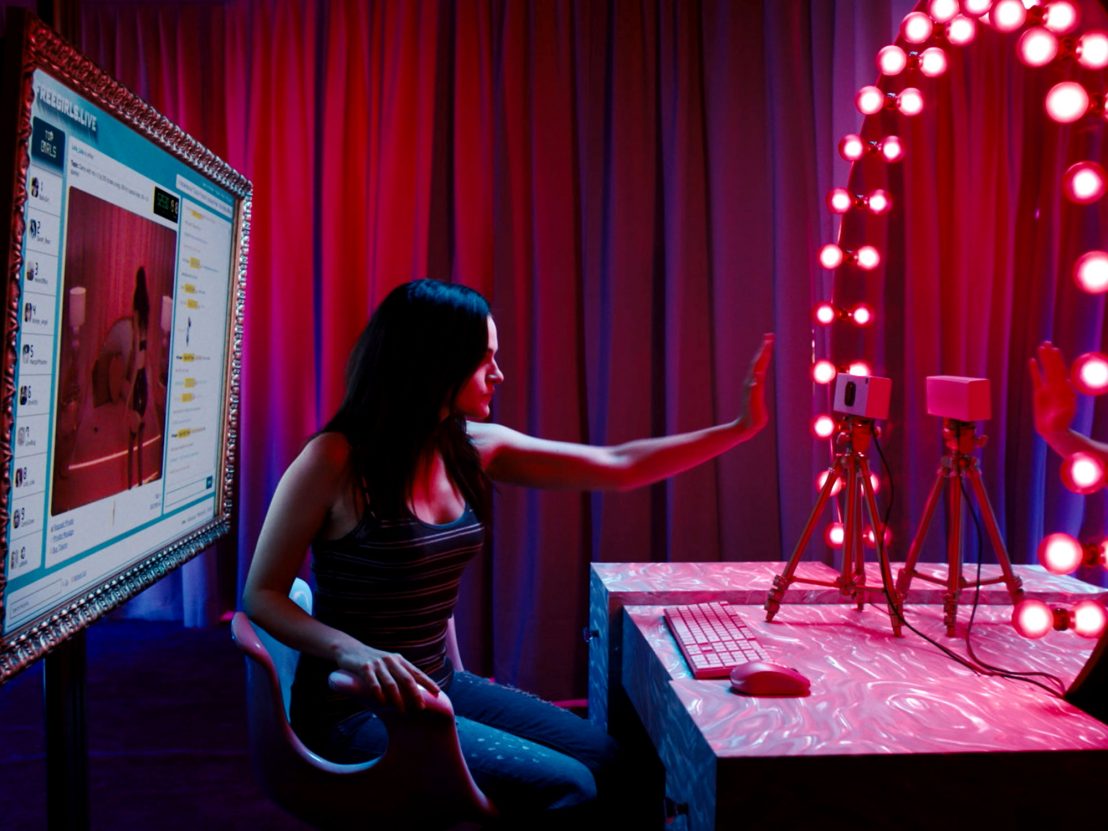
Filmmakers Isa Mazzei and Daniel Goldhaber discuss their provocative techno-thriller Cam.
Acquired by Netflix after winning two awards at the 2018 Fantasia Festival, psychological horror Cam is one of the few films concerning sex work that’s written by a former sex worker. The film’s co-author, Isa Mazzei, had a camming career similar to that of the film’s protagonist for roughly two years – minus the supernatural happenings, we’re told.
The film sees a young camgirl named Alice (alias Lola) discover that she has inexplicably been locked out of her own channel and replaced by an exact double of herself, who goes beyond the rules Lola had previously set for the account’s content, setting in motion the destruction of Alice’s life. Tech support and the police can’t help as a version of Lola is seemingly broadcasting live, so Alice must improvise creative and eventually violent measures to try seizing back her identity. The compelling Madeline Brewer (best known for playing Janine in The Handmaid’s Tale) stars as Alice.
Mazzei, Cam’s screenwriter, and director Daniel Goldhaber first met in high school where they dated and worked together in theatre. They broke up just before heading to different colleges, reconnecting years later around the time that Mazzei had just started camming. Intrigued by that world, Goldhaber was invited by Mazzei to watch some of the behind-the-scenes work that went into a day’s camming and eventually hired to direct a few pornographic videos intended to sell her channel. While getting immersed in that, the pair discussed making a film set within that world and work space.
“Originally,” Mazzei says, “we talked about doing a documentary, but we both really love genre and for me it was really important to bring an audience inside the camming experience. I feel like there’s something inherently voyeuristic about a documentary, whereas with genre, you’re really able to create an empathy with the character because you’re bringing an audience inside this story that’s very thrilling and exciting. And from there, we just started developing the idea.”
The film’s digital doppelgänger set-up is genuinely unsettling, but what lingers most is the level of specificity in the portrayal of Alice/Lola’s day-to-day work. It is among the most sex work-positive features ever made, and Mazzei cites a desire to bust certain notions about sex-related jobs as fuelling the level of detail she and Goldhaber injected into the film; the assumption that all sex workers must be victims or that they all do it out of financial desperation, to name just two.
Even the rare glamourising assumption about that specific career path – that simply taking off your clothes equals riches – is deconstructed through presenting the mundanity and planning involved in successfully running a business as a sex worker. “That is what it was about for us,” Mazzei explains, “normalising this job that is very normal, that very normal people have, and saying, look, it’s a job.” Goldhaber adds, “if there is any moral element to the film, it’s that sex work is work.”
With conversations concerning who gets to tell what stories receiving increasing prominence in cultural discourse, a man in the director’s chair for a tale of sexual exploitation of a woman’s image online might initially raise eyebrows. However, Cam is credited as ‘A film by Isa Mazzei and Daniel Goldhaber’. Non-directors receiving a ‘film by’ credit isn’t unheard of, but it tends to happen more often with documentaries where the director is credited alongside either the subject or, say, the cinematographer.
In the case of Cam, the filmmaking pair are adamant that this was 100 per cent a joint collaboration, and are not afraid to correct even prestigious publications about failing to appropriately credit the co-authorship, be it through only having skimmed press notes, devotion to traditional director-driven ideas of auteurship, or, in some cases, possible prejudice concerning Mazzei’s background in sex work.
“By the time that there was even a first draft done,” Goldhaber says, “it was impossible to extricate whose vision was what in the film because in developing the screenplay together, we were having conversations about how is this going to be shot, how we’re going to talk about it publicly, how we cast it, what kind of actor you cast in the movie, we need a female DoP, all of these things.” Mazzei adds, “it was really cool to work in a new way with Danny, where he really did listen to me about the portrayal of female bodies.”
Even so much as like how we’re shooting Maddie’s body in some scenes. He would defer to me if I brought up issues or questions about it. And I think that was a really cool process for both of us because without this established trust as collaborators that we’ve had for ten years, I don’t know if any other director would have done the same, especially not another male director.”
Cam plays at the BFI London Film Festival on 20 and 21 October, and will be released on Netflix later this year.
Published 19 Oct 2018

In I Used to be Normal: A Boyband Fangirl Story, director Jessica Leski meets three generations of women with a common obsession.

Anna Biller’s The Love Witch offers a playful take on a genre dominated by male perspectives.

By Elena Lazic
Paul Schrader’s 1980 film unashamedly objectifies Richard Gere’s narcissistic lead.